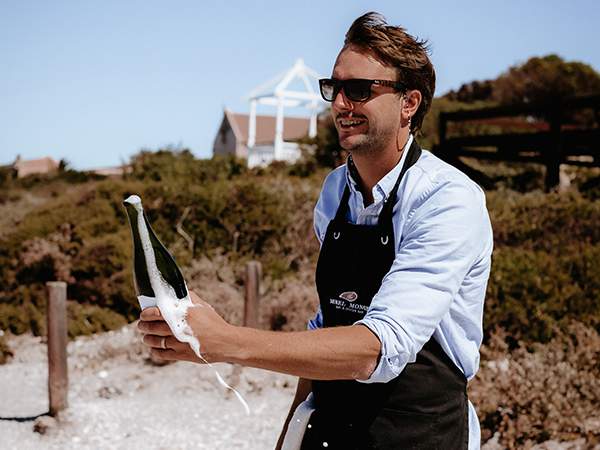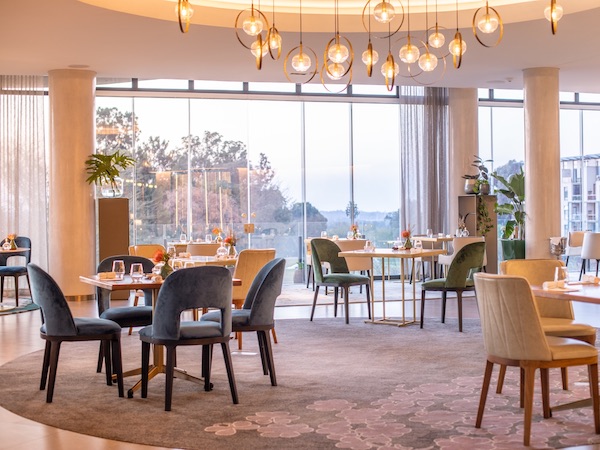News
Want to sell food at a market? Expert Kyle Dods reveals his top tips
Thursday, June 3rd, 2021
The CEO of The MY PLACE Group and one of the Food School’s chef hosts, Kyle John Dods, shares some of the knowledge he has gained from opening The Mussel Monger & Oyster Bar, Sovlaking Delicious and Dashi Poké.
What’s the story behind the name of your company?
The holding company, The MY PLACE Group, actually came from our original idea to create a small personalised eatery that people could refer to as “My Place”. We never imagined that we’d end up developing three gourmet brands that had nothing to do with small eateries and eventually look at developing a model for scale.

How did your journey in this industry begin?
I grew up at La Verona, my aunt and uncle’s restaurant. The restaurant was famous back in the day and encapsulated that concept of a fine establishment. As kids, we spent our days in the kitchen playing among the massive team of chefs, stealing chocolate mousse from the dessert section and learning to whip the chefs with dish cloths. My aunt and uncle also owned a helicopter. Its has been my life dream to be a helicopter pilot and so, at the age of seven, I somehow decided that to be a chopper pilot I would need to become a chef and own a restaurant. Who figured it would have such an impact on me, and decide the direction of my life.
What made you get into cooking and selling food at markets?
I’d been out of restaurants for roughly eight years, focusing on building a career in business and entrepreneurship. A few ill-fated decisions had led to me losing everything, and so by the time I began on markets, all I had was the remarkable experience I’d gathered and my last R800. Nothing else – not even a computer or car. Markets were really my last resort, but I had no other choice. It was the lowest hanging fruit at the time. I did my first market in Saldanha, and tripled my cash, and so began the journey. I took a job for three months as well so I could get a payslip to buy a car again. The first market that accepted me was Hermanus Country Market, and so every weekend we traveled 500km there and back.
How does this differ for you personally from working in a restaurant?
The great thing about markets is the barrier to entry is so low. We literally started with half a braai drum and a few utensils from home. Start a thriving restaurant from day one with this type of capital and equipment? I’d like to see that. Markets expose you to a wide demographic of fresh new clients, mixed with regulars. This gives you the opportunity to test your “market” and get a feel for what works and what doesn’t. The other great aspect is you don’t have to market yourself – they bring the clients, you just need to convince them – so your business is able to thrive from day one, and if you get it right, the ramp up is very fast. I’d say the best aspect about a market, though, is that it lets you build your product and offering in public. This is by far the most beneficial and attractive component. We often feel that to start a business you need to have everything perfect before you take it to your consumers. This is not the case – building your brand and product in public is a brilliant way to evolve to your customer needs. People are more forgiving on markets and so you can adapt and evolve in front of your clients to refine your end product. They also appreciate the journey, so you build immense loyalty. A failure today doesn’t beat you as hard on a market as it does in fixed locations or restaurants.

What’s your experience been like working with Eat Out’s students?
Because the Eat Out Food School students are coming from a different angle from your permanent staff, they end up revealing so many unique aspects of your business that permanent staff won’t necessarily bring to light. So it’s been really enlightening and is helping us to grow. Eat Out also does an immense amount of training and education – taking on the students during this time is like having a year of probation and seeing them develop both academically through the academy but also practically in store. It reduces our risk of taking on employees that may fail and so we would be 99% inclined to employ all our students if they continue to meet these standards. Internships lead to employment because of the reduced risk.
What would be your advice for any young student wanting to work in the industry?
Respect your job. South Africa has an employment crisis, not only because there aren’t jobs, but because of the lack of employable depth. When I say depth, I don’t mean skill sets – I mean lack of great attitude and respect for their jobs. So respect your job and build your career. You only have one shot to build a solid, consistent CV.
What do you look for in a person, when it comes to hiring them?
If you have no previous experience, then we look for an eagerness to learn, willingness to work from the bottom up (this shows if a person has grit) and reliability. If you have experience, we look for a CV that shows succession in work, at least one year in each position, and four weeks plus resignation periods. These three factors immediately indicate if someone has respect for their position and respect for building their CV. It also shows if they’re able to take responsibility.
What’s the biggest lesson you have learnt along the way?
Resilience. Entrepreneurship will surely be the hardest thing you’ll ever undertake and yet at the same time be the most fulfilling. You will be beaten non-stop and it takes an immense amount of resilience to pick yourself up and carry on. The thing is you realise the fruits of your hard work far down the line. It’s a lot like watching a stock on an index fund – it has these massive spikes and dips, but at the end of the day, the overall graph sees consistent growth. Your effort today is the profit you will realise years down the line. You just can’t give up, and that takes huge resilience.

What was the first dish you made/sold at a market and why?
During one of my previous business trips to Greece, we stopped at a restaurant called Thanasis, just off Monostaraki Square in Athens. I was told it was the best souvlaki I’ll ever have. About a hundred Greeks were pushing to get into the door. I spotted an open table, sat down and a waiter walked up to me. He said: “What are you doing?” I responded: “I heard you make the best Souvlaki in Athens.”. He said, “Okay, but you eat, you drink and then you go…” pointing his finger to the door. It was amazing, but I felt I could make it better. When the time came to begin on markets, it’s the first thing that came to mind, and so the first brand of The MY PLACE Group was born: Sovlaking Delicious.
View this post on Instagram
What’s your go-to Friday night meal?
Wow, difficult question! I’d say any meal that takes a considerable amount of craft and passion. It can be something as simple as a dim sum from Ed Hung’s South China Dim Sum Bar, an incredible dish focused on flavour from any of Liam’s restaurants, or a beautifully shucked oyster that’s fresh and, more importantly, has been properly handled. Food needs passion. That’s it. I still remember the best meal I ever had was at a lunch prepared by Peter Goffe-Wood. It was for a De Wetshof lunch for a group of about 40 top Cape Town chefs. His opening statement was that he had no interest in showing off and that he spent more time sourcing the ingredients than he did cooking the meal. It was such a simple meal of smoked yellowtail, roasted rump and rice pudding, but it was outstandingly delicious. Why? Because of passion.












